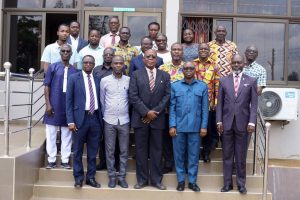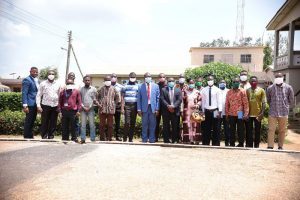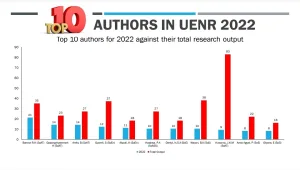The University of Energy and Natural Resources (UENR) has signed a Memorandum of Understanding (MoU) between Tomsk Polytechnic University (TPU) of the Russian Federation.
The partnership between the two institutions which is championed by the Ghana Atomic Energy Commission seeks to give Ghanaian Students access to nuclear-related education and create a cross-culture in the areas of Education, Training and Research in Nuclear Science and Engineering.
Briefing the gathering before the signing of the agreement, the Vice-Chancellor of UENR, Prof Harrison Dapaah who led the UENR team appreciated the government’s effort in advocating the need to develop Nuclear Energy in the country which he said places high importance in studying Nuclear Technology. Prof. Dapaah added that the collaboration will give UENR the opportunity to contribute to the government’s agenda of nuclearizing the country as well as help train students in that area.
The leader of the Russian counterparts Prof. Pavel Zhuparlev of Rosatom Technical Academy speaking on behalf of the delegation said Nuclear Energy is not only useful in medicine but in education which therefore calls for the MoU to enable students to pursue and acknowledge the importance of using Nuclear Energy.
A Senior Research Scientist at the Ghana Atomic Energy Commission, Dr. Vincent Agbodemegbe in his speech said among the power generation options, Nuclear Technology has been proven to not only supply power at stable and affordable pricing but also ensure the reliability and resilience of power infrastructure. “Nuclear Power Generation has clearly shown the huge difference in development between Middle-Income Countries and High-Income Countries. This has heightened the need to develop nuclear infrastructure for power generation in Ghana” he stated.
Dr. Agbodemegbe further added that the least cost power production in Ghana has become a target in almost all government plans and agenda mentioning Ghana Beyond Aid, the Long-Term National Development Plan among others as some of the policies which all indicate the need to produce and supply reliable power at stable and affordable pricing for Ghanaians.
The Dean−School of Engineering, Prof Nana Sarfo Derkyi giving his remarks, recognized the fact the Nuclear Energy is highly demanded in Ghana hence the need to enrol courses in the area of Nuclear Energy at each Department of the School in sustaining the goals of the MoU and contribute to the national agenda at large.







